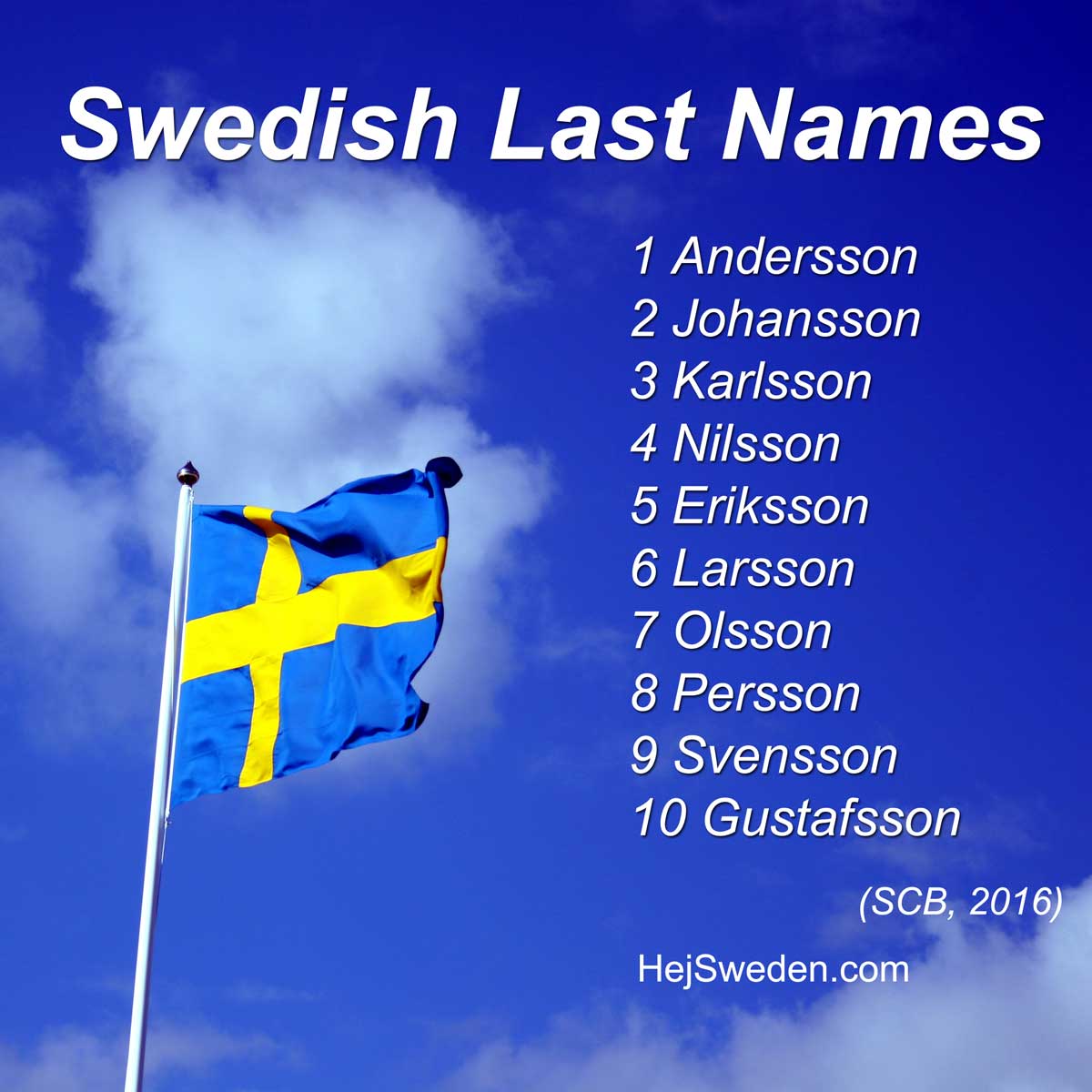Swedish last names offer a fascinating glimpse into the rich cultural heritage of Sweden. With a history that dates back centuries, these surnames often tell stories of lineage, occupation, geography, and personal characteristics. Many Swedish last names have their roots in the Viking Age, reflecting the traditions and customs of the time. Understanding these names not only deepens our appreciation for Swedish culture but also helps us connect with our ancestry.
As we navigate through the world of Swedish last names, we will uncover their meanings, origins, and the various naming conventions that have evolved over the years. The significance of these names extends beyond mere identification; they also serve as a link to the past, revealing how families have evolved through the ages. In this article, we will delve into the intricacies of Swedish surnames, exploring their historical context and contemporary relevance.
Join us on this enlightening journey as we examine the various types of Swedish last names, their meanings, and some famous bearers of these names. From traditional naming systems to modern adaptations, the exploration of Swedish last names is sure to pique your interest and deepen your understanding of Scandinavian culture.
What are the Common Types of Swedish Last Names?
Swedish last names can generally be categorized into a few types, each with its own unique characteristics. Here are some common types:
- Patronymic Names: These surnames are derived from the father's first name, often combined with a suffix such as -sson (son) or -dotter (daughter).
- Geographical Names: Many surnames originate from specific locations or landmarks, indicating where a family lived or came from.
- Occupational Names: Some last names are linked to a person's profession, reflecting the trades and crafts that were common in Sweden.
- Nicknames: Certain surnames are derived from personal characteristics or traits, often reflecting a person's appearance or disposition.
How Do Patronymic Naming Conventions Work in Sweden?
Patronymic naming is a traditional practice in Sweden where a child's surname is derived from their father's first name. This system was widely used until the late 19th century and is still evident in many modern Swedish last names. The suffix -sson means "son of," while -dotter translates to "daughter of." For example:
- Andersson: Son of Anders
- Jansson: Son of Jan
- Olofsson: Son of Olof
Are There Any Unique Examples of Swedish Last Names?
Indeed, several Swedish last names have intriguing stories or meanings behind them. Here are a few unique examples:
- Björk: Meaning "birch tree," this name may have been given to families living near birch forests.
- Lindgren: This name translates to "lime tree," often associated with a person's residence.
- Svensson: Meaning "son of Sven," it is one of the most common surnames in Sweden.
What Role Do Swedish Last Names Play in Ancestry Research?
Swedish last names are crucial in tracing genealogies and understanding family histories. By examining the meaning and origins of these names, researchers can gain insights into their ancestral roots. Furthermore, the use of patronymic names can help identify family connections across generations. Many genealogy enthusiasts find that Swedish last names hold the key to unlocking their family's past.
Can You Provide Examples of Famous Individuals with Swedish Last Names?
Absolutely! Many notable figures have Swedish last names that have made significant contributions across various fields. Here are a few examples:
| Name | Profession | Notable Achievement |
|---|---|---|
| Alfred Nobel | Chemist, Engineer | Inventor of dynamite; established the Nobel Prizes |
| Greta Garbo | Actress | Icon of classic Hollywood cinema |
| Ingmar Bergman | Film Director | Influential filmmaker known for his contribution to cinema |
What are Some Popular Swedish Last Names Today?
In contemporary Sweden, certain last names have gained popularity. Some of the most common Swedish last names include:
- Andersson
- Johansson
- Karlsson
- Svensson
- Nilsson
How Are Swedish Last Names Evolving in Modern Times?
As society changes, so do naming conventions. In modern Sweden, there is a growing trend towards adopting more diverse last names that reflect multicultural influences. Additionally, the traditional patronymic system is less rigidly followed, with many families opting for hyphenated or combined surnames. This evolution showcases the dynamic nature of language and culture, as Swedish last names continue to adapt to contemporary societal norms.
What Resources Are Available for Learning More About Swedish Last Names?
For those interested in exploring Swedish last names further, several resources are available:
- Online genealogy databases
- Swedish heritage organizations
- Books on Swedish naming conventions and history
- Local museums and cultural centers
In conclusion, Swedish last names are not just identifiers; they are rich with history, culture, and meaning. Understanding their origins and significance can provide valuable insights into Swedish heritage and personal ancestry. Whether you are exploring your own family history or simply intrigued by the beauty of these names, the world of Swedish last names is a captivating journey worth embarking on.


